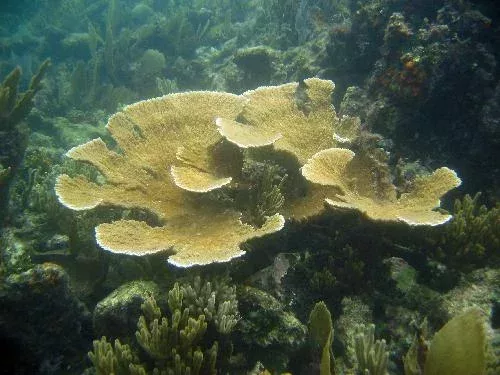With help from the Coral Reef Alliance (CORAL), the Healthy Reefs Initiative, and Amatela, a Tela-based organization, the Honduran government has designated Tela Bay, which contains one of the Caribbean’s healthiest coral reefs, a federal Site of Wildlife Importance. Close to 800 elkhorn corals (Acropora palmata), listed as critically endangered on the IUCN’s Red List and threatened under the U.S. Endangered Species Act, live in the Bay while the Capiro Banks reef has almost four times more live coral cover than most reefs in the region. When the area was first surveyed and described in 2011, the partnership also measured an uncommonly high density of the long-spined sea urchin, which has seriously declined throughout the Caribbean, on the reef.
After being presented with survey data showing the astounding health and diversity of the Capiro Banks reef and the impressive number of endangered elkhorn corals, the Honorable David Zacaro, Mayor of Tela, took quick action and declared Tela Bay a municipally protected area in 2012, restricting the most destructive practices on the reef. In January of this year, the National Institute of Forest Conservation and Development, Protected Areas and Wildlife (ICF) designated Tela Bay a Site of Wildlife Importance, recognizing its ecological significance. More than 75 percent of the Caribbean’s reefs are threatened, and live coral covers only 18 percent of the region’s reefs overall. Capiro Banks is thus significant because of its potential to support economically important fish stocks, genetic diversity of corals, and a growing tourism industry. The 800 elkhorn corals growing adjacent to the shoreline protect the mainland—and its gorgeous beaches—from erosion during storms.
The designation came about through extensive collaboration and partnerships, work that was generously supported by Bloomberg Philanthropies and the Oak Foundation. “The Mayor of Tela has shown a tremendous amount of leadership in this effort, supported by CORAL and the other groups on the ground,” said Jason Babbie, who works on environment programs at Bloomberg Philanthropies. “I am impressed by how quickly this designation came together for this ecologically important site.”
Contact: Jenny Myton, Honduras Field Manager
Source: http://coral.org/unique-coral-reef-receives-federal-protection-in-honduras/

